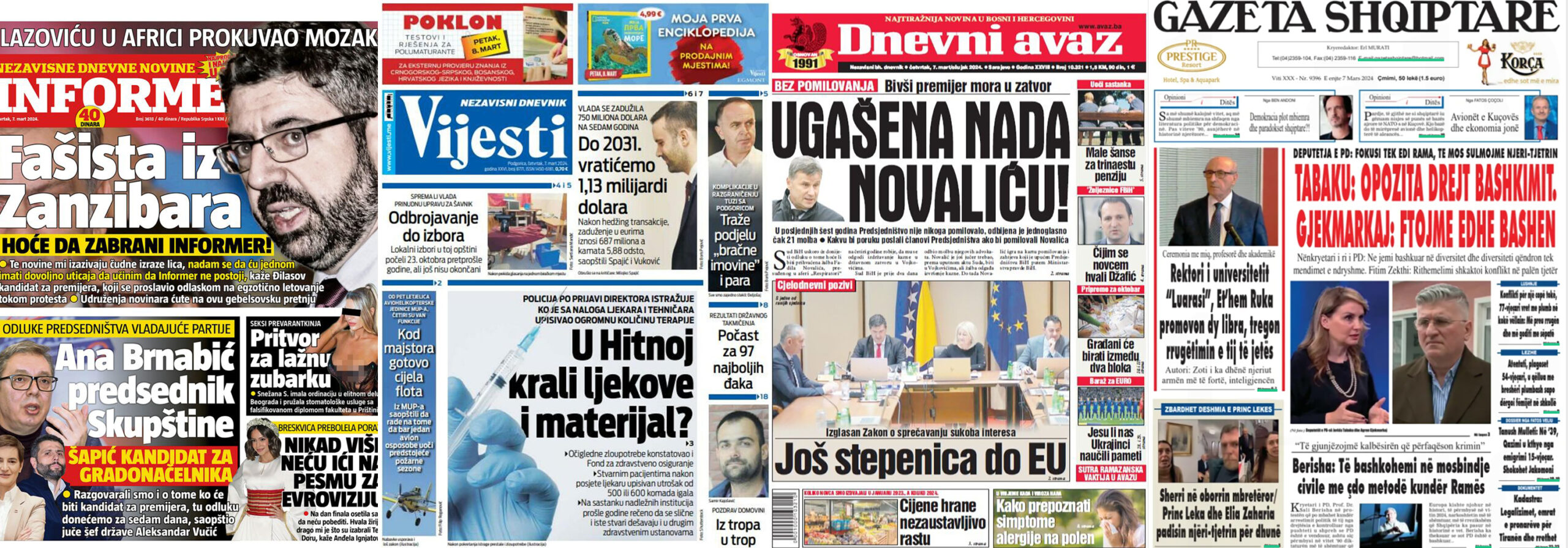The 2024 Freedom House “Freedom in the World” report presents a comprehensive overview of the state of freedom across the globe, marking the 18th consecutive year of decline in global freedom. Amidst armed conflicts causing severe suffering, unfair elections have emerged as leading contributors to the erosion of freedom worldwide. Michael J. Abramovitz, President of Freedom House, starkly noted a significant regression in global freedom during 2023, cautioning that if democratic societies fail to address these challenges, a vast majority of the global population will be deprived of fundamental freedoms in the coming years, ultimately impacting peace, prosperity, security, and freedom globally.
In the Western Balkans, the report encapsulates the political and civil liberties status of six countries, all categorized within the “Partly Free” zone, albeit with notable disparities. Serbia, for instance, continues its several-year decline, starkly contrasting Montenegro, which is merely a point shy of being classified as free. This regional assessment underscores the nuanced landscape of freedom in the Balkans, where each country’s unique political and societal dynamics contribute to their individual standings.
Serbia’s report is notably alarming, as the country has maintained its status as one of the nations with the most significant decline in democratic freedoms over the last decade. This decline places Serbia in a concerning group alongside Bosnia and Herzegovina, Hungary, Russia, Turkey, and Poland, where the erosion of democratic principles has been particularly pronounced. The ruling Serbian Progressive Party (SNS) has been identified as a key actor in this regression, with a systematic approach toward undermining political rights and civil liberties. The SNS’s tactics have included exerting pressure on independent media, stifling political opposition, and constraining the activities of civil society organizations, contributing to an increasingly constrained democratic space. The blurring of the lines between the state apparatus and the ruling SNS party is coupled with these highlighted concerns, showcases a troubling trend toward the consolidation of power and the suppression of dissent.
The Freedom House report begins its assessment of Serbia’s political freedoms and civil rights in 2023 with a critical examination of the numerous factors contributing to the country’s declining democratic health. Electoral manipulations, attacks on regime critics, pervasive corruption, state-propagated propaganda, and pressures on the media have been highlighted as significant issues. Furthermore, the undermining of the judiciary’s independence and a lack of transparency in governmental operations have been pinpointed as crucial factors that have tarnished Serbia’s democratic reputation.
On a brighter note, Montenegro stands out in the region, closely approaching the threshold for being considered a free country. Despite this commendable position, the report highlights limitations in citizens’ meaningful participation and influence in public consultations on legislation and policy reforms. Issues such as inaccessible budget planning and lack of transparency in government contracts persist, underscoring areas where improvement is necessary to fully realize democratic principles.
Bosnia and Herzegovina remains mired in a deeply entrenched dysfunctional political system, placing it near the bottom of the European list in terms of political functionality’s impact on human rights, civil liberties, and political participation. The intervention by the High Representative in the formation of the entity government has further exacerbated the country’s democratic deficits, raising serious questions about the citizens’ ability to freely elect their leaders and the legitimacy of the transfer of power, a fundamental aspect of democratic governance.
Albania has shown progress, particularly in the judiciary’s vetting process, enhancing the fight against corruption and improving citizens’ access to justice. Despite these advancements, transparency issues and governance dysfunctions remain pressing concerns. The conduct of local elections has been criticized for not fostering an environment conducive to free and fair electoral processes. Nevertheless, Albania has made strides in re-engaging citizens in democratic processes and adhering to EU reform commitments.
In Kosovo, despite a challenging year marked by increased violence in northern municipalities, progress in human rights and civil liberties has been acknowledged. Advances in political processes, citizen participation, and a vibrant civil society reflect positive strides. However, concerns about media freedom and journalist safety persist, even as significant headway has been made in minority and religious rights protection, positioning Kosovo as a leader in some democratic pillars within the Western Balkans.
North Macedonia, like its neighbors, remains in the “Partly Free” category but harbors significant hopes for a stronger democracy and enhanced protection of civil liberties, particularly after the government change in 2017. Despite a turbulent year, there were expectations for the government to leverage democratic processes to hold individuals accountable and transition the country towards a more democratic, freer state. However, concerns about legal changes and unresolved corruption cases from the past have dampened these expectations, underlining the need for significant political changes to foster a more democratic environment.
As the Western Balkans strive toward European Union integration, a path fraught with both promise and complexity, the importance of steadfast commitment to democratic reforms and the rule of law becomes increasingly paramount. The anticipated Freedom House “Nations in Transit” report, expected by the end of the month, will offer a further opportunity to delve into the nuanced state of regional affairs, providing a critical lens through which to assess the progress and setbacks in the ongoing reforms across the region.
***
On a critical note, it must be stated that the recent iterations of Freedom House’s “Freedom in the World” report, particularly concerning Montenegro and its regional counterparts, have shown a discernible decline in analytical rigor. One cannot help but notice a pattern of repetition and a certain lethargy in the researchers’ approach, coupled with an inexplicable bias that ultimately risks undermining the report’s credibility. Such shortcomings result in a portrayal of Western Balkans nations that often diverges from the on-ground realities, raising questions about the thoroughness and impartiality of these assessments.
The reports’ treatment of significant political figures and parties, alongside the uneven acknowledgment of external influences and organized crime. the disproportionate focus on certain actors over others, the omission of critical events such as the threats faced by the Chief Special Prosecutor, and a lackluster examination of media, academic, and religious freedoms all contribute to a narrative that seems partially disconnected from the complex reality in Montenegro and the region.
Ljubomir Filipović. Montenegrin political scientist




